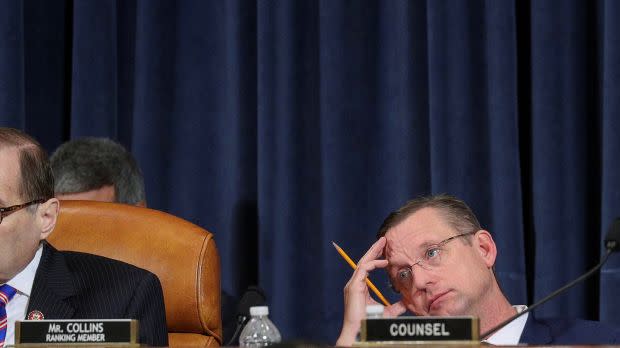Republicans abandon constitutional originalism at impeachment hearing

The House Judiciary Committee held a hearing on the constitutional grounds for presidential impeachment today, two months into an inquiry into US president Donald Trump’s Ukraine dealings. The featured witnesses were four constitutional law scholars.
Naturally, the hearing focused on the framers’ intent when writing the foundational legal document. Usually, that’s an approach to legal analysis that Republicans embrace, indeed it’s the basis of their favorite legal philosophy, originalism. Yet, today, the committee’s ranking member, Rep. Doug Collins, mocked the mandate underlying the philosophy.
During the hearing, three scholars testified that the president committed impeachable offenses, including bribery, abuse of power, and obstruction of justice. They were Harvard law professor Noah Feldman—who was previously an impeachment skeptic, he said—Pamela Karlan of Stanford University, and Michale Gerhardt of the University of North Carolina.
The fourth conceded that Trump may well have committed impeachable offenses, but argued that the evidence has been insufficiently developed and that the case needs “saturation and maturation.” The odd man out was Jonathan Turley, a professor at George Washington University law school and a practicing criminal defense lawyer.
He contended that Democrats are rushing to judgment and that more process is due to prove whether or not the president committed impeachable offenses. Turley explicitly stated that he doesn’t support Trump and didn’t vote for him but said, “This isn’t improvisational jazz—if you’re going to impeach a president for bribery you have to make it stick.”
Turley testified that his esteemed colleagues are wrong in their assessment of the framers’ intent with respect to the Constitution’s impeachment clause, and specifically the requirements for a bribery charge. Although an impeachable offense doesn’t technically have to be a crime because it is a constitutional process, Turley admitted, he insisted that Democrats must still show all the elements of criminal bribery and allow for a “full and fair adversarial process.”
“The statement has been made that this is a clear case of bribery, it’s not,” Turley told the committee. He said that Democrats were relying on a definition of bribery from the 18th century that was as flawed then as it is now because it didn’t lay out specific elements of an offense. “We’re all channeling the intent of the framers and that’s always a dangerous thing to do,” Turley warned.
The lawyer joked that suddenly the left had taken a surprising turn toward originalism, a legal philosophy that mandates looking to the text of the Constitution and the framers’ intent to interpret the law. It is championed by conservatives but not their sole reserve.
As Georgetown University law professor Randy Barnett, a convert to the philosophy, explained in a 1999 paper in the Loyola Law Review entitled “An Originalism for Nonoriginalists,” originalism is now “the prevailing approach to constitutional interpretation.” Barnett told Quartz last year that it’s the most reliable and viable legal theory around, and noted that there are progressive originalists, like his Georgetown colleague constitutional law scholar Lawrence Solum.
Still, Collins—evidently pleased with Turley’s testimony—picked up on Turley’s originalism riff and took it further. He ribbed the scholar that the Democrats had suddenly enlisted the framers to be jury members in this impeachment process Collins has been calling a “sham.”
Collins marveled at the fact that anyone purported to imagine what the members of the Constitutional Convention of 1787 might think about this postmodern event even though discussing their intent and the document they ultimately agreed upon was the whole point of the hearing, and indeed the mandate of the legal philosophy the right champions so vociferously.
In this respect at least, Collins was being disingenuous. He knows very well that asking what the framers were thinking when they wrote the nation’s foundational legal document is not only legitimate, but is the only way to illuminate the current debate about Trump’s impeachment.
Sign up for the Quartz Daily Brief, our free daily newsletter with the world’s most important and interesting news.
More stories from Quartz:
